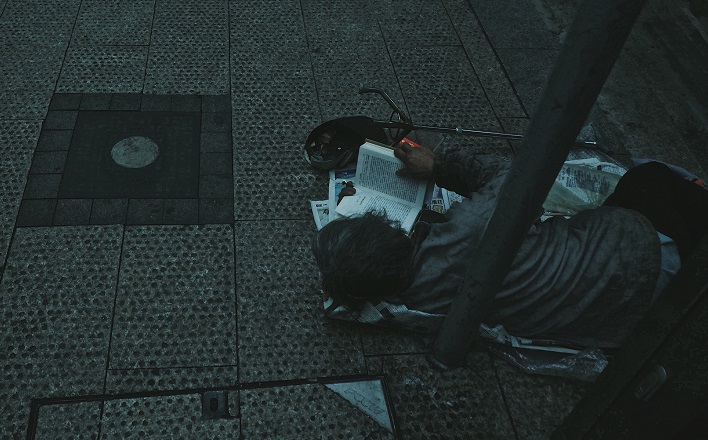Commentary on Joel 2:23-32
Why did God let this happen? This is the question that drives the Book of Joel.
Natural disaster and Ordinary Time
As I write this, the Midwest has endured a record setting streak of tornadoes and floods. Headlines daily alert us that earth is groaning under the burden of this invasive species called humans with headlines such as ‘We are in trouble’ now that global carbon emissions reached record setting highs in 2018.1 Panic is creeping into the hearts of even the most confident earthlings. Natural (and human-made) disasters disrupt our ordinary time and lead us to ask questions of God and God’s power. Why is God letting this happen? We need prophets like Joel in our time to address the cries of creation.
The specific plague in Joel’s context is the result of a violent invasion of locusts. It may be hard for us to envision just how devastating a locust plague was and is. Joel describes the invasion in the first chapter: an entire life and livelihood is laid waste by these creatures. The terrain appears to have been attacked by a scorching fire. Picture the aftermath of 2018 fires in Paradise, California.2 Or the devastation after a tornado tore through Linwood, Kansas this summer, turning mature trees into piles of toothpicks and flattening homes.3
Entire lives and livelihoods lost. Joel stands with his people in the wreckage before the promises described in our pericope can be imagined and proclaimed:
Be dismayed, you farmers,
wail, you vinedressers,
over the wheat and the barley;
for the crops of the field are ruined …
surely, joy withers away among the people” (Joel 1:11; 12b).
This is the reality for so many as a result of climate change and natural disaster. Before we move to the promise of restoration (our pericope for today), we, like Joel, must name the devastation and call for repentance.
Suggestion to the preacher: Pull the camera back
Consider wandering away from our passage to set the whole scene. I don’t see this as an issue when you encounter a minor prophet like Joel (and again next week in Habakkuk). These texts do not make their way into our lectionary often. And when Joel is referenced, it is often through the mouth of Peter and through the lens of Pentecost or through the lens of Ash Wednesday rather than preached in its’ own right into the suffering we endure in ordinary time. We also have placed human beings at the center of the reading, when Joel paints a picture of the deep and God-breathed connection of people to land and animals.
For example, before our passage begins, two other audiences are addressed and claimed in the promise of a better tomorrow: soil and animals.
Do not fear, O soil;
be glad and rejoice,
for the Lord has done great things!
Do not fear, you animals of the field,
for the pastures of the wilderness are green;
the tree bears fruit,
the fig tree and vine give their full yield (Joel 1:21-22).
As we live in these uncertain times with signs of warning calling from the earth, perhaps we should shift this pericope, expand it beyond the anthropocentric, and place it back into context. For with Joel, joy results from creation’s harmony. Joy is a field that is green, a tree bearing fruit. Joy is animals of the field fed and full. And yes, people fed and people prophesying. But all things in relation, and all embedded in God’s creation.
“The day of the Lord”
The concept of “the day of the Lord” comes from prophets describing Yahweh’s judgment on Israel and Judah in the near future because of the people’s failure to follow Yahweh’s commandments. In this way, destruction is ultimately brought upon by ourselves. Theodicy is addressed and answered: we are suffering because we have been disobedient.
Again, the parallel to our current climate crisis is ripe for exploration, preachers. We have brought destruction on ourselves because we have failed to honor the soil, sky, and land as just stewards of God’s creation. Who will then gather the young and old and bid the congregation to purify themselves (2:16)? How can we rouse God on behalf of God’s land and people (2:18-19)?
Out of the trauma, Joel and other prophets dream of a better world. Prophets dream, with Yahweh, of a prosperous future for a traumatized people unable to see beyond the devastation. This world Joel imagines is one in which rain falls as it should, harvests are plentiful, human and bovine bellies are full and God’s spirit pours out on all people.
What world will you imagine for your congregation?
Notes:
- https://www.washingtonpost.com/energy-environment/2018/12/05/we-are-trouble-global-carbon-emissions-reached-new-record-high/?noredirect=on&utm_term=.f9e580f14217
- https://www.sfchronicle.com/california-wildfires/article/Camp-Fire-Paradise-in-recovery-six-months-later-13815152.php
- https://www.washingtonpost.com/nation/2019/05/29/large-extremely-dangerous-tornado-rips-through-kansas-causing-multiple-injuries-catastrophic-damages/?utm_term=.8f8fa29c512a


October 27, 2019